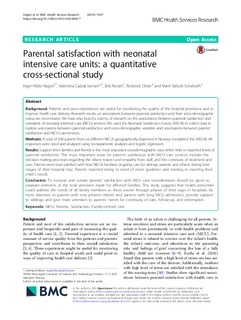parental Satisfaction with neonatal intensive care units: a quantitative cross-sectional study
Hagen, Inger Hilde; Cabral Iversen, Valentina; Nesset, Erik; Orner, Roderick; Svindseth, Marit Følsvik
Journal article, Peer reviewed
Published version
Permanent lenke
http://hdl.handle.net/11250/2585916Utgivelsesdato
2019Metadata
Vis full innførselSamlinger
Originalversjon
https://doi.org/10.1186/s12913-018-3854-7Sammendrag
Background
Patients and users experiences are useful for monitoring the quality of the hospital provisions and to improve health care delivery. Research results on associations between parental satisfaction and their socio-demographic status are inconclusive. We have also found a scarcity of research on the associations between parental satisfaction and standards of neonatal intensive care (NICU) services. We used the Neonatal Satisfaction Survey (NSS-8) to collect data to explore associations between parental satisfaction and socio-demographic variables and, associations between parents’ satisfaction and NICU care-services.
Methods
A total of 568 parents from six different NICUs geographically dispersed in Norway completed the (NSS-8). All responses were rated and analysed using nonparametric analyses and logistic regression.
Results
Support from families and friends is the most important sociodemographic area which links to reported levels of parental satisfaction. The most important areas for parents’ satisfaction with NICU care services include the decision making processes regarding the infant, respect and empathy from staff, and the continuity of treatment and care. Parents were least satisfied with how NICUs facilitate ongoing care for siblings, parents and infants during later stages of their hospital stay. Parents reported being in need of more guidance and training in meeting their child’s needs.
Conclusion
To increase and sustain parents’ satisfaction with NICU care considerations should be given to separate elements of the total provision made for affected families. This study suggests that health personnel could address the needs of all family members as these evolve through phases of their stays in hospitals; be more attentive to parents with very preterm infants and parents with long NICU admissions; provide support to siblings; and give more attention to parents’ needs for continuity of care, follow-up, and information.

